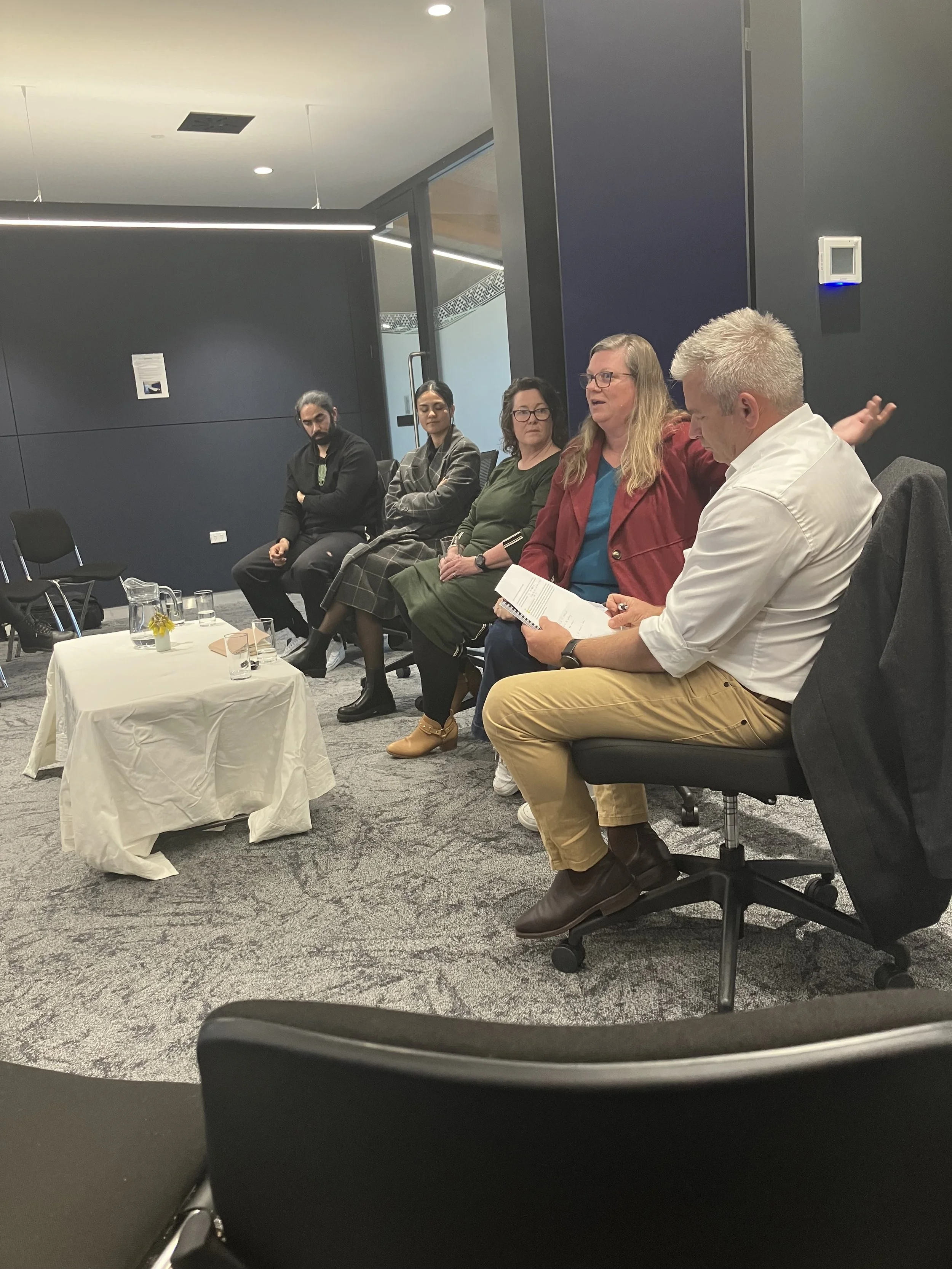Māori Wards panel discussion
Panelists Rhieve Grey, Wahine Murch, Traceylee Hooton and Kim Manunui, chaired by Ben Westerman.
Whether the referendum on Taupō’s Te Papamārearea Māori Ward results in it continuing in 2028 or not, the need to encourage understanding and for a Māori voice in local affairs will not be going away.
This was one of many takeaways from Monday night’s panel discussion at Waiora House featuring Kim Manunui, Traceylee Hooton, Wahine Murch and Rhieve Grey, chaired by Ben Westerman.
This local body election had included a lot of misinformation, said Westerman to the 40 strong audience, including that the very forum he was chairing was “wasting ratepayers’ money.”
It was being put on by a passionate group and not costing anything, he said. He felt including a te ao Māori view was important in the running of Taupō.
“I would challenge anyone to question how having Karam Fletcher or Danny Loughlin at the Taupō District Council table has done anything but produce good results.”
As one of the organisers, Manunui, originally from Canada, said her experience through marrying into Ngāti Tūwharetoa and in having her daughters raised as bilingual showed there often weren’t people in leadership roles that her children could look up to.
But she felt compelled, despite concerns about being labelled an activist, to “open people's eyes to what life can be like if you embrace the culture more than just watching a kapa haka performance.”
Fellow organiser Hooton said studies in indigenous psychology had led her to learning about Te Tiriti o Waitangi and she wanted others to know more and look at Māori Wards from an informed point of view.
Delving into the figures showed nine out of a possible 98 candidates in past local body elections in Taupō had Māori whakapapa.
“I think that really shines a light on this question.”
For Te Papamārearea candidate Murch, a Māori Ward provided a safe and inclusive space and encouraged those whose reality was not the boardoom or council chamber to come forward.
“There’s this talk… about we're all one people. I don't agree, because we're not one people. We have different whakapapa, we have different genealogy. It's about acknowledging that and learning to live in harmony... We just need to figure out a way forward together because we're better off together.”
Grey said his growing awareness of the disparity in Aotearoa New Zealand had driven him to want “to square things for a lot of the people who looked like me but didn't have the same sort of opportunities as me, because I had the sense that it wasn't their fault...”
“It's got everything to do with history, and it's got everything to do with a failed promise called Te Tiriti o Waitangi.”
Everything people could do to make the picture fair again was a good thing to do, he said.
“The truth is, and it's not just Māori, but there is a concentration for Māori, poverty is rife. People are out there having a hard deal, every single day…
“But we need to do so much more outside of Māori Wards. Māori Wards are just one small part of that solution where we can allow a fairer shake of the stick right across that spectrum.”
Knowledge of the text of the treaty but also its historical context would enable people to converse within stories of partnership, he said.
“As opposed to divisiveness that I think, to be honest, has been taken from central mainstream actors and implemented here.”
A local council affected people’s daily lives more than central government said Manunui.
“It's the park or the library or our roads, or our water that we drink, or how we look after our land, the trees that we've funded through Greening Taupō… So to say that it's something that should be in central government, is passing the buck…
“A lot of people talk about rights, our right to this, or their right to that, but let's talk about our responsibilities in that partnership and relationship. We all have responsibilities. (For some) it comes down to what I get out of it, but it's actually what I can give to it.”
She wanted to debunk the idea that using a race-based principle equated to discrimination.
“It’s because you're not excluding anyone. No one has an unfavourable outcome from having a Māori ward.”
She also felt the need to reiterate the difference between equity and equality.
“It is absolutely not semantics. Equality is giving everyone the same opportunity. Equity is about fairness and understanding the position that they come from – background, influences… and giving them the opportunity for an equitable outcome.
On the idea that only Māori should vote in the referendum Grey, Murch and Manunui all thought this would be an opportunity wasted to embrace collaboration and foster a change in mindset.
Grey also thought questions of effectiveness a red herring – though if it was going to be tested perhaps that should be limited to just those on the Māori roll.
“It's just so unfortunate that it has been framed like that, this kind of performance thing… It's about rhetoric, fear, and that's unfortunate, because that's what we're having to deal with, so close to the vote.”
While Manunui conceded a majority might not agree with the panel “in the current climate” and the referendum say no, “that doesn't mean the conversation is over. That doesn't mean that we stop doing what we're doing. This is the kind of opportunity for us to actually start these conversations.
“So this isn't the last time you’ll see us.”

